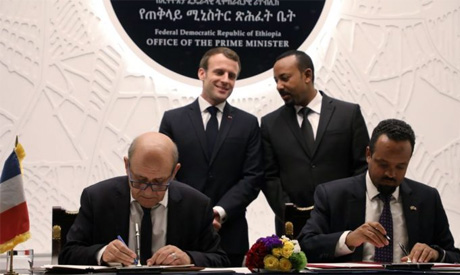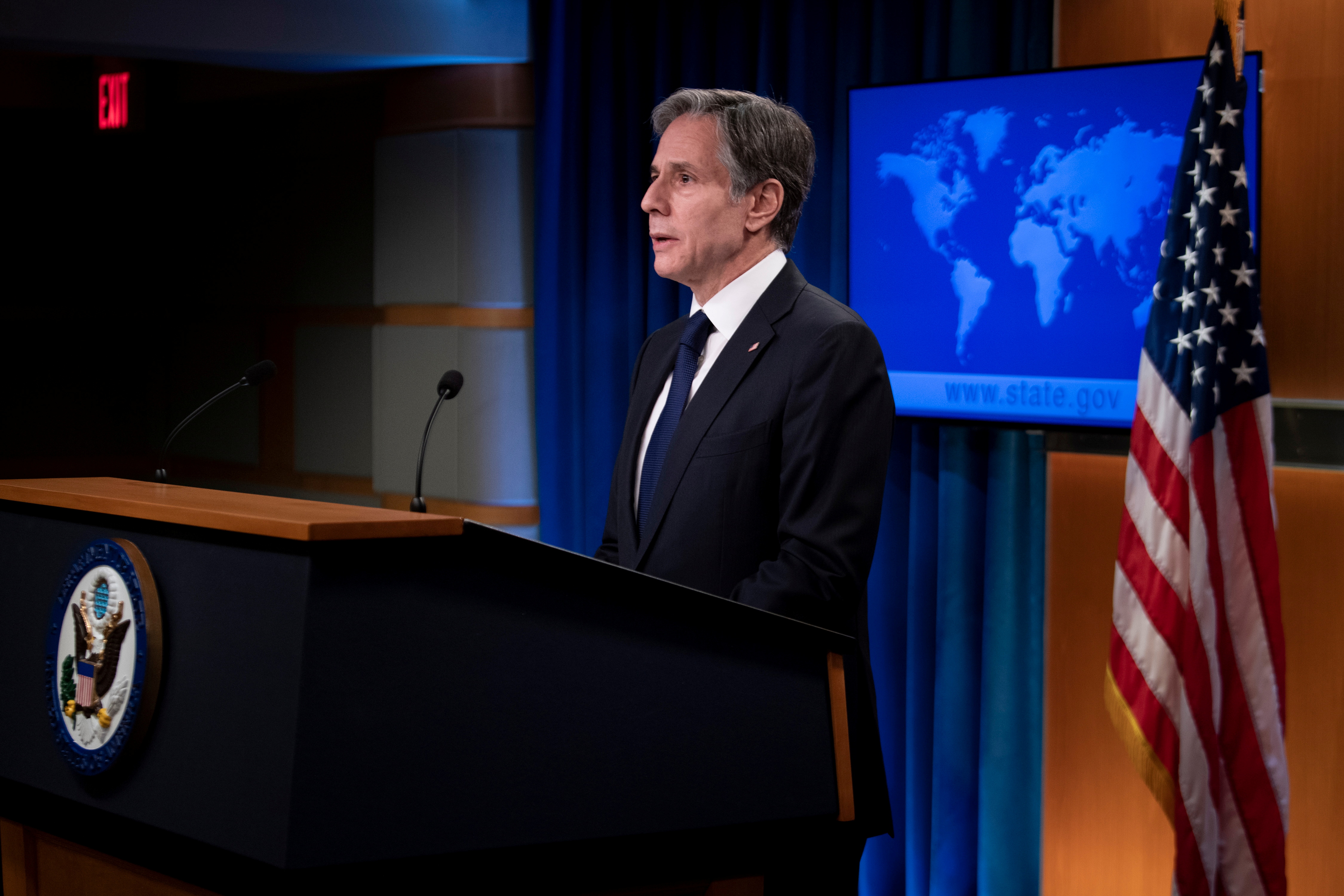“If we do not see progress in these domains, I think the administration made clear that we will not be left with much of a choice,” said Samantha Powers
Source: Washington Post
Samantha Power has long championed humanitarian intervention. Ethiopia’s crisis is putting her to the test.
USAID Administrator Samantha Power speaks during a hearing on Capitol Hill in Washington on July 14. (Jabin Botsford/The Washington Post)
By Max Bearak and John Hudson Yesterday at 1:59 p.m. EDT
NAIROBI — On the day Samantha Power landed in Ethiopia this week, its civil war — now escalating and spreading beyond the northern region of Tigray — entered its 10th month.
Amid allegations that Ethiopian troops and their allies have committed war crimes and ethnic cleansing and have driven parts of Tigray into famine, the United States has already withheld security assistance and effectively banned travel for top officials.
But Power, who is in charge of the U.S. Agency for International Development, or USAID, holds the biggest American lever of influence over Addis Ababa: more than $1 billion in annual aid ranging from health and education support to food and emergency humanitarian response, which makes the United States the largest aid donor to Ethiopia.
It’s a moment seemingly made for Power, the former U.N. ambassador under President Barack Obama who came to prominence in 2002 with her book “A Problem From Hell,” which excoriated American inaction during mass killings in Rwanda and the Balkans in the 1990s, Europe during World War II and the Ottoman Empire during World War I.
“Samantha Power is a world-renowned voice of conscience and moral clarity — challenging and rallying the international community to stand up for the dignity and humanity of all people,” President Biden said in a statement when he appointed her.
Her work inspired a generation of humanitarian activists and helped popularize the notion that Washington bore a unique responsibility to protect the world’s most vulnerable populations, including with military force if necessary.
Power’s one-day trip Wednesday to Ethiopia, which didn’t include a meeting with Prime Minister Abiy Ahmed, was a test of whether she can restore faith in America’s role in preventing mass atrocities beyond its borders. So far, the U.S. measures curtailing security assistance and sanctioning officials have had little effect beyond turning Ethiopian sentiment against Washington.
“The United States has been working in Ethiopia for 60 years. USAID has spent a billion dollars in the last year in this country, including several hundred million dollars in development assistance. We’re delivering tomorrow 1.4 million vaccines,” Power said in a phone interview from the airport in Addis Ababa as she wrapped up her visit.
“There is so much we want to do together, but this is an own-goal,” she added, referring to the government’s increasingly antagonistic attitude to humanitarian aid groups, journalists and allies in the West.
Unable to control Tigray, Ethiopia isolates region already beset by famine and war
Ethiopia’s government accuses those allies of failing to back its military offensive against the Tigray People’s Liberation Front, a group the government has designated as terrorists but whom the West dealt with over three decades when the TPLF controlled the country before Abiy’s rise.
Members of the military gather during a ceremony for recruits in Addis Ababa on July 27. (Amanuel Sileshi/AFP/Getty Images)
Top Ethiopian officials have also accused some international aid groups of not just siding with the TPLF but also helping smuggle arms to it, and they have alleged that Western governments and media have overplayed atrocities linked to Ethiopian government forces while overlooking those allegedly committed by the TPLF.
Addis Ababa has responded defensively to allegations that it has committed crimes against civilians and hindered aid. The government puts nearly all the blame on the TPLF.
Inside the Biden administration, the option of using military force to stop the bloodshed in Tigray is seen as a non-starter. But withdrawing substantial amounts of aid is also seen as a poor option, because it is unlikely to change the Ethiopian government’s war strategy and instead deepen what is already one of the world’s most dire humanitarian crises.
Pressed on how and when punitive measures on aid might come into play, Power said she was still in wait-and-see mode. As for what she achieved at her meetings in Addis Ababa, she said she only got more commitments.
“It’s not the kind of track record that would give one confidence yet that those commitments are imminently to be met,” she said. Her requests were in line with the State Department’s recent public statements: that humanitarian aid be unhindered in delivery and that government-aligned troops from neighboring Eritrea as well as militias from the country’s Amhara region withdraw beyond Tigray’s prewar borders.The State Department has also called on Tigrayan forces to withdraw from the Amhara and Afar regions, where they have recently gone on the offensive, displacing around a quarter of a million civilians.
“If we do not see progress in these domains, I think the administration made clear that we will not be left with much of a choice,” she said. The European Union has already withdrawn most of its financial support for aid programs in Ethiopia.
The outlook in Ethiopia is decidedly grim. The government initially pushed the TPLF out of Tigray’s main towns, but the TPLF retook most of the region last month in an offensive that analysts say resulted in a large portion of the Ethiopian army being killed or captured.
The TPLF has since moved into neighboring regions with the stated objective of obliterating what’s left of the government and its allies’ military capacity. On Thursday, Reuters reported that the TPLF had taken control of Lalibela, a sizable town within the Amhara region and home to Ethiopia’s famed 12th-century rock-hewed churches.
The Ethiopian government has in turn sought to recruit widely from regional militias, drawing in fighters from parts of the country previously uninvolved in the conflict.
Asked at a news conference in Addis Ababa about Abiy’s recent use of words like “weeds,” “cancer” and “disease” to refer to the TPLF, Power cautioned that “there are many, many people out there who hear rhetoric, hateful rhetoric or dehumanizing rhetoric and take measures into their own hands
Displaced people protect themselves from the rain at a camp in the town of Azezo, Ethiopia, on July 12. The camp hosts Ethiopians as well as Eritrean refugees uprooted by the ongoing war in the Tigray region. (Eduardo Soteras/AFP/Getty Images)
Power’s past advocacy for humanitarian intervention, including with U.S. military force, has fallen out of favor in recent years as public confidence in Washington’s ability to reshape distant lands wanes. U.S. forces will conclude a 20-year occupation in Afghanistan in September, and the military will formally end combat operations in Iraq by the end of the year, Biden said last week. The two missions have cost thousands of lives, trillions of dollars and fallen far short of U.S. ambitions to bring about stability, democracy or prosperity. The protracted chaos and bloodshed in Libya following the ouster of Moammar Gaddafi in a NATO-led military operation in 2011 also dampened the appeal of humanitarian interventions.
Defenders of the administration say its lack of bold action in confronting the Ethiopian crisis does not indicate a lack of concern.
“There is a false narrative that the Biden administration does not care about mass atrocities, fueled by its decision to risk mass violence in Afghanistan,” said Richard Gowan, a U.N. analyst at the International Crisis Group. “But if you look at Washington’s approach to Ethiopia in particular, you see that the new administration does still have strong humanitarian instincts.”
Power, U.S. Ambassador to the United Nations Linda Thomas-Greenfield and the U.S. special envoy for the Horn of Africa, Jeffrey Feltman, “have all thrown themselves into efforts to halt the Tigrayan war, which hardly seemed to register with the outgoing Trump team,” Gowan said.
Thomas-Greenfield took to Twitter on Wednesday to denounce the Ethiopian government’s decision this week to revoke the operating licenses of Doctors Without Borders and the Norwegian Refugee Council, two humanitarian organizations known for their work in war zones.
“This suspension is unacceptable. I know the work of MSF and NRC well, and they are internationally respected,” she wrote, using the French abbreviation for Doctors Without Borders. “Ethiopia must reconsider this decision.”
At least a dozen aid workers have been killed since November, when Abiy sent troops to Tigray to fight the TPLF after the group allegedly staged an attack on a military base.
The United Nations says the war has left 400,000 people facing famine, while UNICEF estimated last week that more than 100,000 children in Tigray could suffer from life-threatening acute malnutrition in the next 12 months — 10 times the annual average.
Meanwhile, “supplies are just running out,” Power said.
Hudson reported from Washington.













 h
h

















